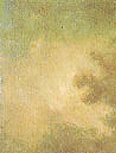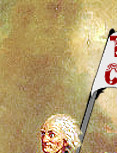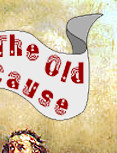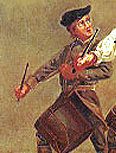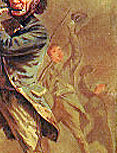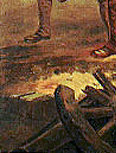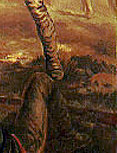Next
comes the matter of atrocities in the war. Many of
these were the work of Tories, that is American colonials
on the British side. These worthies undertook things
which British officers either condemned or countenanced,
depending on the commander. If noticing this serves
to excuse the British high command, however slightly,
so be it; they have enough to answer for on other
accounts, such as countenancing the methods of their
Indian allies, as famously noted by Jefferson in the
Declaration of Independence.
CERTIFIED
GREAT MEN
This
brings us to perhaps the most important question raised
by ‘The Patriot,’ that is, the role of irregular,
partisan forces in winning the war. There are two
schools of thought on this matter. One school holds
that credit for American independence goes without
question to the Certified Great Men who organized
and commanded the regular continental army. Case closed.
Taking every complaint from every regular army officer
from George Washington on down about the liabilities
and lack of discipline of the militia, these writers
give partisan warfare little or no credit for American
victory.
PEOPLE’S
WAR
The
second school sees irregulars as the decisive, secret
weapon of the American Revolution. From the British
standpoint, the American militia were "the sand
in the gears of the pacification machine."1
Washington himself – against his instincts and
training and despite his constant complaints about
the irregulars – perforce adopted tactics which
conformed to the logic of people’s war. As historian
William F. Marina puts it, despite successes in pitched
battles, "the British were never anywhere
near ‘victory’ in the American Revolution."2
Edmund
Burke, a member of the parliamentary Whig faction
grouped around the Duke of Rockingham, had this to
say in his ‘Letter to the Sheriffs of Bristol,’ April
3, 1777: "Indeed, our affairs are in a bad condition....
But America is not subdued. Not one unattacked village
which was originally adverse throughout that vast
continent has yet submitted from love or terror. You
have the ground you encamp on, and you have no more.
The cantonments of your troops and your dominions
are exactly of the same extent. You spread devastation,
but you do not enlarge the sphere of authority."
Burke
had begun to see that the colonists were waging what
later theorists named "people’s war." In
such wars, holding territory for its own sake is not
the point. The point is to harass the enemy, wear
him down, cut his supply lines, and never allow him
a moment’s relief. The main body of revolutionary
forces, if such there be, can be kept intact by avoiding
unequal, pitched battles, until the time when it becomes
feasible to launch battles of annihilation against
the weary, overextended foe. The fact that there are
one or two decisive battles at the end of the
struggle may allow the regular army to take all credit
for victory, but that is a minor problem. At least
it was a minor problem until Mr. Garry Wills and Professor
Michael Bellesiles lately came forth to tell us that
irregular forces – militias, guerrillas, whatever
one wants to call them – contributed next to nothing
to the outcome of the war, save perhaps to "keep
order" in a few localities.
This
anti-militia reading of the Revolution rests on a
complete neglect of the guerrilla aspects of the war.
But to continue with Edmund Burke: "I can well
conceive a country completely overrun, and miserably
wasted, without approaching in the least to settlement."
Further: "The whole of those maxims upon which
we have made and continued this war must be abandoned."3
As
the war dragged on and public opinion in England hardened,
the anti-war criticisms of the Rockingham Whigs became
more muted. But Burke had spotted the main outlines
of the imperial dilemma. From the American side, the
irrepressible Thomas Paine sketched out the logic
of people’s war in The
Crisis Papers. He compared the war to "a
game of draughts" and although he never ceased
to call for the creation of an effective army, he
realized that the loss of any particular piece of
real estate such as Philadelphia or Charleston was
not decisive in a revolutionary war. What mattered
was that local forces stay in the fight, exploiting
their natural advantages against an external invader,
until a large army could be formed for a decisive
final battle. Thus: "It is not the conquest of
towns, nor the accidental capture of garrisons, that
can reduce a country so extensive as this. The sufferings
of one part can ever be relieved by the exertions
of another, and there is no situation the enemy can
be in, that does not afford to us the same advantages
that she seeks herself."4
The
Bergen County, New Jersey, militia was made up of
Dutch-American partisans. Its members rotated duties,
so as to permit farming and other normal activities
to go on, kept order locally, and made a very important
contribution to the war in their sector. As "sand
in the gears" they were very good indeed. They
will have to stand in for other cases, as they are
one of the few such partisan units which has been
studied in detail.5
WHAT
SHOULD ANY OF THIS MEAN TO US TODAY?
To
start with, these matters have some bearing on the
meaning of the Second Amendment, but that is a debate
we need not get into today. The possible role of decentralized
military units in the genuine defence of a
post-imperial America is not without interest in our
times. Strangely, former Senator Gary Hart has written
a book on the matter, but I have yet to study it fully.
Suffice
it to say that the "lessons" of the American
Revolution, if we can ever agree on what they are,
might suggest some advantages of decentralized defence.
Equally important, there may be a lesson or two from
the imperial standpoint. Decentralized, flexible opponents
can be very troublesome for imperialists. True, a
sufficiently ruthless imperial power can crush guerrilla
opponents, as in the second Anglo-Boer War, but it
does so at a significantly higher material and moral
cost.
There
is also the small matter of the impact of imperial
policy, successful or unsuccessful, on the domestic
life of the imperialist nation. This is something
we dwell on around here. As Burke put it, "Contending
for an imaginary power, we begin to acquire the spirit
of domination, and to lose the relish of honest equality.
The principles of our forefathers become suspected
to us, because we see them animating the present opposition
of our children.... All dread of a standing military
force is looked upon as superstitious panic. All shame
of calling in foreigners and savages in a civil contest
is worn off. We grow indifferent to the consequences
to ourselves from the plan of ruling half the
empire by mercenary sword.... Many things have been
long operating towards a gradual change in our principles;
but this American war has done more in a very few
years than all the other causes could have effected
in a century."6
A
final thought: it is a hallmark of the anti-militia
reading of the Revolution that ideology is neglected.
Yet, John Adams wrote that the change of the American
mind about our relation to the Crown was the Revolution.
The "American synthesis" – as Robert Shalhope
calls it – was a perhaps imprecise fusion of
republican theory, Lockean liberalism, English law,
and Protestantism. Exact or not, it was the ideology
which made the Revolution possible and, then, necessary,
and which over time made the Revolution more radical.
The ideological dimension goes far in explaining the
persistence of colonial partisans in the face of discouragement
and "free-riders" and further shows in what sense
the Revolution was indeed a people’s war.
Notes
